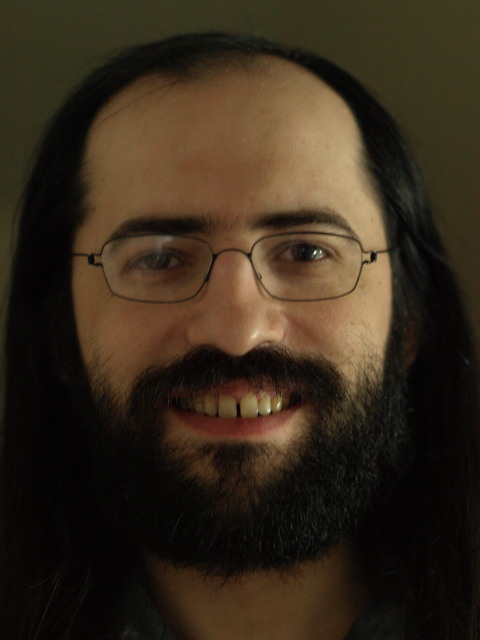
Tutorials
The conference will have a set of tutorials, presented on July 14. Tutorials gently present broad topics of interest; the tutorials are reasonably self-contained, but advanced.
Tutorial 1: Ilya Shpitser
(Harvard University)

Causal inference: from effects of interventions to learning and
inference with partial observability.
Establishing cause-effect relationships is fundamental to progress of empirical science. A general mathematical theory of causation which supports human causal intuitions is thus of utmost importance for formalizing and perhaps one day automating scientific inquiry. This tutorial will describe one such theory of causation, based on graphical models. The tutorial will consist of two parts.
The first part will introduce graphical causal models as vehicles for expressing causal assumptions, and interventions as an operation formalizing the notions of causal effects and counterfactuals. Examples of using this framework to pose and answer practical causal questions in public health will be given. The first part will conclude by giving a general algorithm for identifying causal effects from observational studies, and showing how the so called post-truncation independence constraints in latent variable graphical models can be given an interpretation in terms of such effects.
The second part will discuss a recursive factorization (r-factorization) for latent variable graphical models, and show how post-truncation constraints which do not make an appearance in directed acyclic graph (DAG) models are captured by this factorization. A causal interpretation of this factorization will be given. The second part will conclude by giving some notable examples of such models, including testably distinct models which agree on all conditional independences, and models with a graph fully specified by a single post-truncation independence.
Biographical details
Ilya Shpitser is a Research Fellow at the Department of Epidemiology of the Harvard School of Public Health. He received his Ph.D. from UCLA in 2008 under the direction of Judea Pearl. Prior to Harvard, he was a postdoctoral scholar working on learning gene regulatory networks in Eleazar Eskin's bioinformatics group at UCLA. His research interests include causal and statistical inference and learning in graphical models. He was the co-recepient of the best student paper award at UAI-06 for his work on identification of causal effects.
Tutorial 2: Milind Tambe and Christopher Kiekintveld
(University of Southern California and University of Texas at El Paso)


Game Theory for Security:
Lessons learned from deployed applications
Security at infrastructure of economic, political, or symbolic importance is a key concern around the world. Game theory is well-suited to adversarial reasoning for security resource allocation and scheduling problems, and allows us to generate security strategies that are unpredictable, but also based on the information about the relative risks of different kinds of attacks. Many new algorithms and modeling techniques have been developed to support recent real-world applications of game-theoretic analysis in security domains. For instance, the ARMOR system was the first to apply this framework, and has been deployed at the Los Angeles International Airport (LAX) since August 2007 to randomize checkpoints on the roadways entering the airport and canine patrol routes within the airport terminals. The IRIS tool was developed as a game-theoretic scheduler for randomized deployment of the Federal Air Marshals (FAMS). These applications are leading to use-inspired research in scaling up to very comples problems, handling significant adversarial uncertainty, dealing with bounded rationality of human adversaries, and other fundamental challenges.
This tutorial will cover: (i) background on game theory and basic adversarial reasoning techniques; (ii) overview of some fielded applications and a discussion of the key challenges; (iii) an in-depth discussion of the basic algorithmic approaches to solving these games and a brief overview of more advanced techniques and recent results; (iv) discussion of the challenge of modeling different types of uncertainty in security domains and solving the resulting game formuluations; and (v) presentation of methods used in evaluation of this research.
Biographical details
Milind Tambe is a Professor of Computer Science and Industrial and Systems Engineering at the University of Southern California (USC). He leads the TEAMCORE Research Group at USC, with research is focused on agent-based and multi-agent systems. He is a fellow of AAAI (Association for Advancement of Artificial Intelligence) and recipient of the ACM (Association for Computing Machinery) Autonomous Agents Research Award. He is also the recipient of the Homeland Security Award from the Christopher Columbus Fellowship Foundation, a special commendation given by the Los Angeles World Airports police from the city of Los Angeles, USC Viterbi School of Engineering use-inspired research award, Okawa foundation faculty research award, the RoboCup scientific challenge award, USC Steven B. Sample Teaching and Mentoring award and the ACM recognition of service award. Prof. Tambe and his research group's papers have been selected as best papers or finalists for best papers at a dozen premier Artificial Intelligence and Operations Research Conferences and workshops, and their algorithms have been deployed for real-world use by several agencies including the LAX police, the Federal Air Marshals service and the Transportation security administration. He received his Ph.D. from the School of Computer Science at Carnegie Mellon University.
Christopher Kiekintveld is an assistant professor at the University of Texas at El Paso. His research focuses on computational decision-making and tools for designing intelligent agents, particularly for complex multi-agent systems. He has made contributions that span multiple areas, including computational game theory, distributed optimization, risk analysis, adversarial reasoning, agent-based modeling and simulation, auctions, and trading agents. He received his Ph.D in 2008 from the University of Michigan for thesis work on trading agent design and strategic reasoning using simulation and empirical game modeling techniques. During this time he was a lead developer for Deep Maize, a champion agent designed for the Trading Agent Competition Supply Chain Management game. His most recent work applies game theory to real-world Homeland Security problems to generate unpredictable, risk-based resource allocation strategies. He has contributed to algorithmic advances that dramatically increase the scalability of game theory solutions for security resource allocation problems, and new modeling techniques that improve the robustness of solutions to many different kinds of uncertainty about the models and human behavior. The IRIS system based on this research is currently deployed by the Federal Air Marshals Service, and the GUARDS system developed for the Transportation Security Administration is currently under evaluation for nationwide deployment. The work was recently acknowledged with a best paper award at the top international conference on multi-agent systems, and was a finalist for the EURO excellence in practice award.
Tutorial 3: Pedro Domingos and Kristian Kersting
(University of Washington and Fraunhofer IAIS)


Combining Logic and Probability: Languages, Algorithms
and Applications
AI problems are characterized by high degrees of complexity and uncertainty. Complexity is well handled by first-order logic, and uncertainty by probability. Combining the two in one language would be highly desirable, and the last decade has seen rapid progress in this direction. Many probabilistic logical languages have been proposed, and efficient inference and learning algorithms for them are available, often in open source software. Probabilistic logical techniques have been successfully applied to a wide variety of problems in natural language processing, vision, robotics, planning, social networks, the Web, and other areas. This tutorial begins with an overview of the key issues in this area and the solutions that have been proposed, from representation to learning and inference. As an example, we then focus on Markov logic, which attaches weights to first-order formulas and treats them as templates for features of log-linear models. We look in particular at the application of lifting techniques to probabilistic inference in relational domains, the combination of statistical learning with inductive logic programming (a.k.a. statistical relational learning), and the application of these techniques to machine reading.
Biographical details
Pedro Domingos is Associate Professor of Computer Science and Engineering at the University of Washington. His research interests are in artificial intelligence, machine learning and data mining. He received a PhD in Information and Computer Science from the University of California at Irvine, and is the author or co-author of over 150 technical publications. He is a member of the editorial board of the Machine Learning journal, co-founder of the International Machine Learning Society, and past associate editor of JAIR. He was program co-chair of KDD-2003 and SRL-2009, and has served on numerous program committees. He is a AAAI Fellow, and has received several awards, including a Sloan Fellowship, an NSF CAREER Award, a Fulbright Scholarship, an IBM Faculty Award, and best paper awards at KDD-98, KDD-99, PKDD-05 and EMNLP-09.
Kristian Kersting is an ATTRACT fellow at Fraunhofer IAIS, Bonn, Germany, and a research fellow at the University of Bonn. He received his Ph.D. from the University of Freiburg, Germany, in 2006. After a PostDoc at the MIT, USA, he joined Fraunhofer IAIS in 2008. His main research interests are machine learning, data mining, and statistical relational artificial intelligence. He is the (co-)author of over 60 technical publications, has received the ECML Best Student Paper Award in 2006 and the ECCAI Dissertation Award 2006 for the best European dissertation in the field of AI, and is an ERCIM Cor Baayen Award 2009 finalist for the "Most Promising Young Researcher In Europe in Computer Science and Applied Mathematics". He gave several tutorials at top conferences. He co-chaired MLG-07, SRL-09, and StarAI-10 and (will) serve(d) as area chair for ECML (06,07), ICML (10,11), ICANN (11), as SPC at IJCAI-11, and on the PCs of several top conferences. He is a member of the editorial boards of the Machine Learning journal and the Journal of Artificial Intelligence Research, and an action editor of the Data Mining and Knowledge Discovery journal.